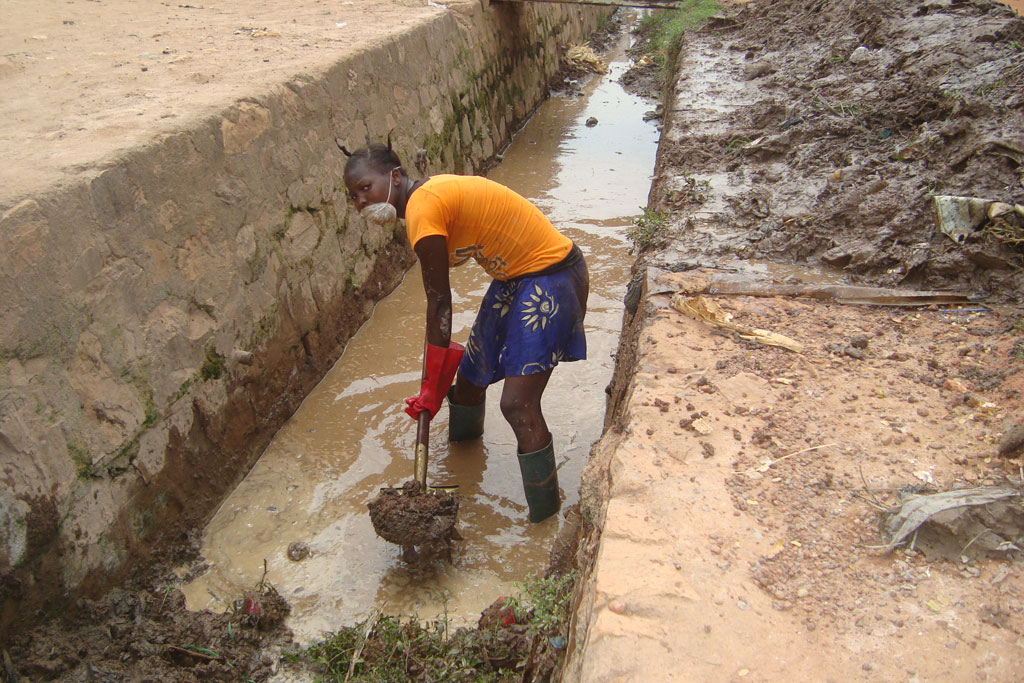
Digging with a mask after war impacts took out this African towns water supply. Disaster often increases the need for work, unfortunately not our ability to pay for it.
For many of us COVID-19 was a wake up call. Not necessarily about our handwashing techniques, the use of masks, or how teleworking may dominate our future, but a wake up call to how fragile our economy and even our political system is. There are many examples of the scriptures about a people who do not believe they could be destroyed:
“We will not believe thy words if thou shouldst prophesy that this great city should be destroyed in one day.” Alma 9:4- People of Ammonihah to Alma.
“And it came to pass that the jews did mock him because of the thing which he testified of them;'' 1 Nephi 1:19- Speaking of Lehi’s prophecy of the destruction of Jerusalem.
Of course there are many more, Noah, Jeremiah, Samuel the Lamanite… the list goes on and on.
And perhaps you could add us. But hopefully COVID has opened our eyes a little. I firmly believe that COVID’s greatest mission may be a simple warning. A way to show us that we need to be prepared for things. Because I strongly believe COVID-19 is not the greatest challenge I, or our society, will face in my lifetime. We need to be prepared for worse.
So, how do we prepare:
- I have always been a supporter of The Church of Jesus Christ stance that you should have a 1-year supply of food. And I did...did being the key word. My storage had dwindled some and the number of people and the amount of food they consumed had increased. I was far from a true year supply of food. We need to take the council prophets have given us for years seriously and get a true 1-year food supply.
- Our supplies should carry more than just food. Okay for some weird reason toilet paper this time was the big one. But if you can’t live without it then you should store some, but it showed us a broader point. There are things that aren’t food that we may not be able to get in disasters and we should store those too.
- Pay off debts and have some money saved. This has been the council for years and we would do well to follow it.
- Live on far less than you make. We have grown accustomed to lifestyles that are not sustainable, the food we eat, the homes we live in, the cars we drive, the boxes of stuff from Amazon, and the electronics that provide endless entertainment. Learning to take a step back and realizing that we can go without them and then doing it will be great preparation. It is far better and honestly easier for us to do it now, when it’s a choice and we can see what works and doesn’t, than wait until we are forced by circumstances. Another thing that can help this one is:
- Find fulfillment through self improvement, service and spending time with family instead of things and increased lifestyle. Many of us, if not all of us will go through a time in the near future when our lifestyle as measured by the world will be significantly reduced. We can prepare today by changing what we value. The best things in life are truly free. If you find your entertainment through service there will always be entertaining things for you to do. But if you only get it from Hollywood and high end dining, you may struggle. In fact, if you really want to find happiness in a disaster the number one thing you can learn to find joy and fulfillment in is...
- Hard work, learn to do it now. No matter how bad things get there will always be work to do. It may not be the work you want to do, and you may not get the salary you want but there will be work, much of it manual work. This has been a huge eye opener to me. I am not good at, nor do I do enough manual labor. I need to prepare by spending more time on the weekends in my yard weeding, trimming, digging, planting, building, painting, and harvesting. As well as, (Hopefully Jeanine doesn't see this, she might hold me to it) in the house cleaning, washing, cooking and picking up. It’s the type of work that is excellent for my mind, my body, and my ability to care for myself in hard times.
If you liked this article please consider subscribing to my blog by entering your email below. Why subscribe? You can then get emails when I write my amazing articles and it really helps me. When I go to publish books or articles my number of subscribers is a big deal to them, so taking the time to subscribe means alot to me.
Very true, Nathaniel.
ReplyDeleteThanks so much. Both for the comment and taking the time to read.
DeleteI agree. Thanks for sharing these insights.
ReplyDeleteThanks so much. Miss you guys. Hope your doing well.
DeleteGood reminder, Nathaniel. I'm glad there are so many checklists and how-to handouts online to help us prepare. It's important to print and include them with your storage supplies.
ReplyDeleteWonderful! Let's plan a few work parties! They are the best!
ReplyDelete